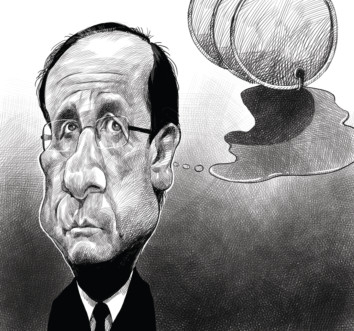
The enormous interest shown by French President Francois Hollande in Middle East affairs is in line with the interest shown by his predecessors, president Nicolas Sarkozy, the Socialists, and the de Gaullists. All of them are in agreement when it comes to this strategic orientation.
During the Sarkozy era, a new page was opened in French-Arab Gulf relations and thus began significant shifts in the French attitude towards Arab issues. This was a revival of the approach adopted by France’s post-Second World War president General Charles de Gaulle. That approach can be summed up by saying that he looked towards reducing France’s dependence on the US when it came to foreign policy and establishing once again the French identity on the international stage.
France is now the second biggest military power in Nato; it is also the most powerful country overlooking the Mediterranean basin and has the second largest economy in Europe. It leads the Francophone group that sees itself as being capable of undertaking a political role at the global level, beyond just being a Nato and European Union (EU) member state. We have seen in recent years an active France that has provided effective support to Arab Spring movements. We have also seen it get involved in the fight against terrorism in more than one continent and are now seeing the intensity of its participation in the war against Daesh (the self-proclaimed Islamic State of Iraq and the Levant). It is attacking Daesh positions in Iraq from more than one base, including from the aircraft carrier Charles de Gaulle, which came to the waters of the Arabian Gulf for this purpose.
In an unprecedented move, Hollande attended the Gulf Cooperation Council (GCC) countries summit in Riyadh last week and gave a speech about strengthening France’s position in these countries and gave the leaders of Operation Storm of Resolve a broader space to manoeuvre.
France is strengthening its position in the region and in doing so, it is strengthening its position in the EU by playing a leading role in risk management at the international level, which reflects positively on the scale of Europe’s involvement in Middle East after France’s departure from the scene almost entirely in the 1950s. France’s interest in the Arab world coincides with Washington’s reluctance in further intervening in Middle Eastern affairs. It also coincides with the drawing of new strategies by traditional US allies in the Gulf region to reduce the size of their security dependence on the US.
GCC countries’ trust and confidence in the US administration may have been dented a bit due to America’s reluctance to adopt effective policies and attitudes towards the important and sensitive issues that threaten the security of these countries, creating a security vacuum, as observed by France and some other countries in the region. The Gulf countries have apprehensions about US policies towards some countries in the region, despite assurances given by US officials in this regard.
The latest move to assure Gulf states came through the invitation to all GCC countries’ leaders to meet US President Barack Obama at Camp David to develop new prospects for the relationship between the US and these countries in issues that are related to their security and the security of the Gulf region in general.
But will France be able to act as a strategic ally of GCC countries? Some will question that because France’s military, economic, political and diplomatic might do not render it a real competitor to the US. Undoubtedly, there are many variables that play an important role in this regard, perhaps the most notable being the GCC leaders’ convictions as laid out by the new Saudi Foreign Minister Adel Al Jubeir, when he told Reuters: “France is a historical ally and a business partner, which has proved to GCC countries that it can be relied upon.”
For its part, France is seeking to develop good relations with Gulf countries to the level of long-term strategic partnerships to secure many strategic interests. France’s major base in Djibouti overseeing the Gulf of Aden and overlooking the Strait of Bab Al Mandeb, and another base obtained in the Gulf, make it an effective partner in security issues related to this area and its water routes. France also shares with the countries in the region concerns about Iran’s nuclear programme. Its views are in line with those of the Gulf states on the Syrian regime. On both these issues, GCC countries are worried because of America’s stand. On the other hand, France is a leading exporter of weapons. In 2014, it exported weapons in excess of $9 billion (Dh33 billion) — a figure that it is expected to increase this year. French military aircraft have an especially good reputation: Dassault’s Rafale fighter jets have become popular in Arab arms markets.
France is also one of the leading countries in the nuclear industry and in making reactors producing electrical energy. It has signed agreements with many GCC countries in this regard.
It is unlikely that the US will abandon its role as guarantor of the security of the Gulf in the foreseeable future because the fundamentals of any state’s formulation of strategy depends on its national security. Its foreign relations are based on aspects that maintain or enhance its security.
From this perspective, the Gulf region is of strategic importance to the US and Europe as long as oil remains the major source of energy in the world, despite expectations of America’s diminished need for oil from the Gulf since the shale industry has become economically viable. However, GCC countries have the right to consider what is in store for them in the post-oil era, which they have indeed been doing.
Mohammad Akef Jamal is an Iraqi writer based in Dubai.









